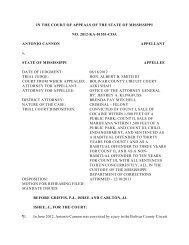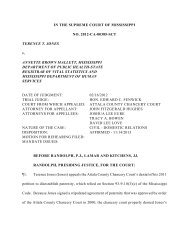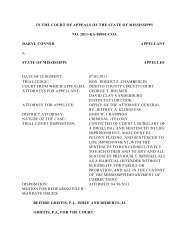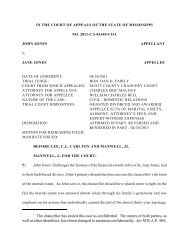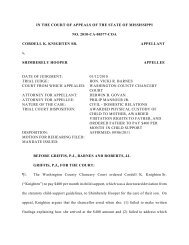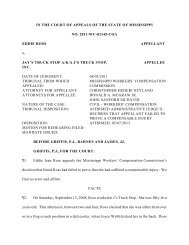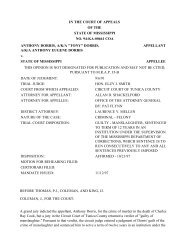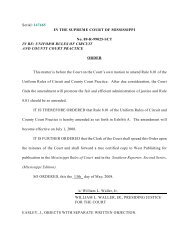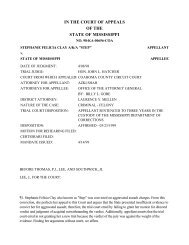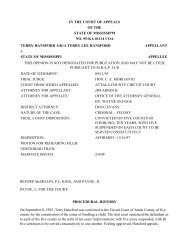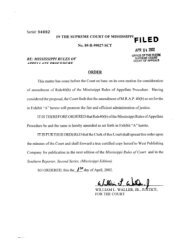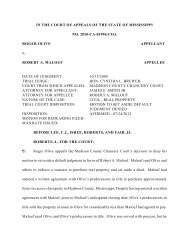2011-CP-01870-COA - Mississippi Supreme Court
2011-CP-01870-COA - Mississippi Supreme Court
2011-CP-01870-COA - Mississippi Supreme Court
Create successful ePaper yourself
Turn your PDF publications into a flip-book with our unique Google optimized e-Paper software.
IN THE COURT OF APPEALS OF THE STATE OF MISSISSIPPI<br />
NO. <strong>2011</strong>-<strong>CP</strong>-<strong>01870</strong>-<strong>COA</strong><br />
SHAWN DOSS A/K/A SHAWN LAMONT DOSS<br />
A/K/A SHAWN L. DOSS<br />
APPELLANT<br />
v.<br />
STATE OF MISSISSIPPI<br />
APPELLEE<br />
DATE OF JUDGMENT: 12/05/<strong>2011</strong><br />
TRIAL JUDGE:<br />
HON. JAMES T. KITCHENS JR.<br />
COURT FROM WHICH APPEALED: LOWNDES COUNTY CIRCUIT COURT<br />
ATTORNEY FOR APPELLANT: SHAWN DOSS (PRO SE)<br />
ATTORNEY FOR APPELLEE: OFFICE OF THE ATTORNEY GENERAL<br />
BY: LADONNA C. HOLLAND<br />
NATURE OF THE CASE:<br />
CIVIL - POST-CONVICTION RELIEF<br />
TRIAL COURT DISPOSITION: DISMISSED MOTION FOR POST-<br />
CONVICTION RELIEF<br />
DISPOSITION: AFFIRMED - 11/27/2012<br />
MOTION FOR REHEARING FILED:<br />
MANDATE ISSUED:<br />
BEFORE IRVING, P.J., CARLTON AND MAXWELL, JJ.<br />
CARLTON, J., FOR THE COURT:<br />
1. Shawn Lamont Doss appeals the circuit court's dismissal of his motion for<br />
post-conviction relief (PCR), claiming that the circuit court improperly deviated from the<br />
State’s recommended sentence and that Doss’s indictment was improperly amended to<br />
charge him as a subsequent drug offender. Finding no error, we affirm.<br />
FACTS<br />
2. On February 8, 2006, a Lowndes County grand jury indicted Doss for Count I,<br />
possession of more than five kilograms of marijuana with the intent to distribute, and Count
II, conspiracy to transfer a controlled substance. On December 4, 2007, the State filed a<br />
motion to amend the indictment to charge Doss as a subsequent drug offender under<br />
<strong>Mississippi</strong> Code Annotation section 41-29-147 (Rev. 2009).<br />
3. Doss’s counsel negotiated a plea deal with the State, in which the State agreed to<br />
recommend a sentence of twenty-four years for Count I and a dismissal of Count II in<br />
exchange for Doss’s knowing, voluntary, and intelligent guilty plea. On November 18, 2008,<br />
the circuit judge accepted Doss’s guilty plea on Count I, and scheduled a sentencing hearing<br />
for November 21, 2008. The circuit court advised Doss to stay out of trouble until the date<br />
of the sentencing hearing, and that if he did so, the court would likely accept the State’s<br />
recommendation. The circuit court further stressed that Doss must attend the sentencing<br />
hearing if he expected to be sentenced in accordance with the State’s recommendation.<br />
4. On November 21, 2008, Doss failed to attend the sentencing hearing. The circuit<br />
judge ordered the bailiff to search for Doss throughout the courthouse. The circuit judge also<br />
asked the defense counsel to call Doss’s cell phone in an attempt to reach him. When<br />
questioned by the judge, the bail bondsman indicated that after speaking to Doss’s parents,<br />
it was her understanding that Doss was “on his way.” The bail bondsman stated that she tried<br />
to reach Doss too, but to no avail. After waiting forty minutes, the circuit court proceeded<br />
with sentencing.<br />
5. The circuit judge entered a judgment, sentencing Doss as a subsequent drug offender<br />
to fifty years in the custody of the <strong>Mississippi</strong> Department of Corrections. The circuit judge<br />
stated on the record that if Doss appeared prior to the end of term with a valid reason<br />
explaining why he missed his sentencing hearing, the circuit court would consider amending<br />
2
the sentence.<br />
6. On November 16, <strong>2011</strong>, Doss filed a PCR motion in the circuit court, which the<br />
circuit court dismissed. Doss now appeals to this <strong>Court</strong>, claiming: (1) the circuit court erred<br />
in deviating from the agreed sentencing recommendation; and (2) the circuit court erred in<br />
allowing the State to amend Doss’s indictment after Doss pled guilty to reflect his status an<br />
a subsequent drug offender.<br />
STANDARD OF REVIEW<br />
7. In considering the dismissal of a PCR motion, we review the circuit court's findings<br />
of fact for clear error. Williams v. State, 872 So. 2d 711, 712 (2) (Miss. Ct. App. 2004).<br />
However, when reviewing issues of law, this <strong>Court</strong>'s proper standard of review is de novo.<br />
Brown v. State, 731 So. 2d 595, 598 (6) (Miss. 1999).<br />
DISCUSSION<br />
I. SENTENCE<br />
8. Doss argues that the circuit court erred in deviating from the State’s agreed sentencing<br />
recommendation. Doss concedes that he was aware that the trial court does not have to<br />
accept the State’s recommendation. However, Doss claims that if the recommendation is not<br />
accepted, the petitioner must be afforded the opportunity to withdraw his guilty plea. Doss’s<br />
claims are in conflict with existing <strong>Mississippi</strong> jurisprudence and Uniform Rule of Circuit<br />
and County <strong>Court</strong> 8.04(B)(2). 1<br />
1<br />
Uniform Circuit and County <strong>Court</strong> Rule 8.04(B)(2) provides:<br />
The prosecuting attorney, defendant's attorney, or the defendant acting pro se,<br />
may reach an agreement that upon an entry of a plea of guilty to the offense<br />
3
9. The <strong>Mississippi</strong> <strong>Supreme</strong> <strong>Court</strong> has repeatedly held that a trial judge who did not<br />
participate in the plea-bargaining process is not bound by the terms of a plea agreement<br />
between the defendant and the State. Collins v. State, 975 So. 2d 219, 229 (23) (Miss.<br />
2008); see also Martin v. State, 635 So. 2d 1352, 1354 (Miss. 1994) (“In order to renege on<br />
a deal, you must be a part of the deal.”). Further, as long as the circuit court explains to the<br />
defendant that the court is not bound by the State’s recommendation, “it is not error if the<br />
trial court does not follow the prosecutor's sentencing recommendation.” Martin, 635 So.<br />
2d at 1355.<br />
10. Our <strong>Court</strong> addressed a similar issue in Rhone v. State, 957 So. 2d 1018 (Miss. Ct.<br />
App. 2006). In Rhone, the circuit court advised John Rhone that if he attended the<br />
sentencing hearing, the court would accept his guilty plea, as well as the one-and-one-halfyear<br />
sentence recommended in the plea bargain. Id. at 1020 (3). The circuit court then<br />
informed Rhone of the possible maximum sentence for his charge, and Rhone indicated that<br />
2<br />
he understood. Id. After Rhone failed to appear at his sentencing hearing, the judge<br />
charged or to a lesser or related offense, the attorney for the state may do any<br />
of the following:<br />
a. Move for a dismissal of other charges; or<br />
b. Make a recommendation to the trial court for a particular<br />
sentence, with the understanding that such<br />
recommendation or request will not be binding upon the<br />
court.<br />
2<br />
John Rhone complied with the plea agreement and arrived for his January 18, 2002<br />
sentencing hearing. Id. at 120 (5). At the courthouse, Rhone received a message from his<br />
attorney instructing him that the hearing had been rescheduled and to return on February 12,<br />
2002. Id. On February 12, 2002, Rhone failed to appear for the rescheduled sentencing<br />
4
sentenced Rhone to thirty years in the custody of the <strong>Mississippi</strong> Department of Corrections,<br />
half of his possible maximum sentence. Id. at (5). On appeal, this <strong>Court</strong> affirmed Rhone’s<br />
conviction and sentence, explaining “the prosecution did not breach its plea agreement —<br />
[Rhone] did [by failing to appear].” Id. at 1022 (14).<br />
11. The record reflects no claim by Doss that he entered his plea unknowingly,<br />
involuntarily, or unintelligently. Additionally, the record shows that Doss indicated his<br />
understanding of the circuit judge’s instructions that the court would not accept the State’s<br />
sentencing recommendation if Doss failed to attend the sentencing hearing. The transcript<br />
reflects that the circuit judge stressed on the record that if Doss failed to “show up . . . all bets<br />
are off.” We thus find no error in the circuit court imposing upon Doss a greater sentence<br />
than that recommended by the State.<br />
II.<br />
AMENDED INDICTMENT<br />
12. Doss next argues that the circuit court erred in allowing the State to amend his<br />
indictment after he pled guilty to reflect his status an a subsequent drug offender. Doss<br />
claims that he was unaware of the amendment prior to the day of his guilty-plea hearing.<br />
13. The record reflects Doss was indicted on February 8, 2006, for possession of<br />
marijuana with intent to distribute. The State moved to amend the indictment on December<br />
4, 2007, to reflect Doss’s previous conviction in Oklahoma for possession of a controlled<br />
substance with intent to distribute. The State argues that it put Doss on notice of the motion<br />
hearing. Id. The circuit court again rescheduled the sentencing hearing for April 22, 2003,<br />
at which time the judge sentenced Rhone to half the amount of his possible maximum<br />
sentence. Id.<br />
5
to amend the indictment to include Doss’s status as a subsequent drug offender eleven<br />
months prior to Doss entering his guilty plea.<br />
14. This <strong>Court</strong> has stated that amendment of an indictment to reflect that the defendant<br />
is a subsequent or habitual offender “is allowed so long as ‘the defendant is afforded a fair<br />
opportunity to present a defense and is not unfairly surprised.’” Wells v. State, 57 So. 3d 40,<br />
48 (27) (Miss. Ct. App. <strong>2011</strong>) (citing URCCC 7.09). In this case, the record shows no<br />
unfair surprise, since the State filed the motion to amend the indictment prior to the entry of<br />
Doss’s guilty plea. Amending an indictment to reflect habitual- or subsequent-offender<br />
status “only affects sentencing and does not affect the substance of the offense charged”;<br />
therefore, we find the amendment to Doss’s indictment failed to affect his possible defenses<br />
to his possession charge. Burrell v. State, 726 So. 2d 160, 162 (4) (Miss. 1998). We note<br />
that Doss offered no evidence during the sentencing hearing contesting the subsequent-drugoffender<br />
charge.<br />
15. In Wells, 57 So. 3d at 48 (27), this <strong>Court</strong> held that:<br />
an amendment requested on the day of the trial to add an enhanced penalty was<br />
proper where the defendant was apprised of the charge pending against him,<br />
was not unfairly surprised, and was afforded a fair opportunity to present his<br />
defense.<br />
(quoting Williams v. State, 766 So. 2d 815, 816-18 (5-10) (Miss. Ct. App. 2000)). Doss’s<br />
guilty-plea petition reflects that he was aware that his sentence was subject to enhancement.<br />
The plea petition also lists his previous conviction.<br />
16. After reviewing the record, we find no error in the timing of the amendment. The<br />
record reflects the amendment presented no unfair surprise to Doss, and Doss knowingly<br />
6
entered his guilty plea as a subsequent drug offender. This issue is without merit.<br />
17. THE JUDGMENT OF THE LOWNDES COUNTY CIRCUIT COURT<br />
DISMISSING THE MOTION FOR POST-CONVICTION RELIEF IS AFFIRMED.<br />
ALL COSTS OF THIS APPEAL ARE ASSESSED TO LOWNDES COUNTY.<br />
LEE, C.J., IRVING AND GRIFFIS, P.JJ., BARNES, ISHEE, ROBERTS,<br />
RUSSELL AND FAIR, JJ., CONCUR. MAXWELL, J., CONCURS IN PART AND<br />
IN THE RESULT WITHOUT SEPARATE WRITTEN OPINION.<br />
7



